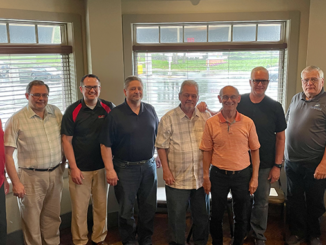
The devastating news of Pastor Andrew Stoecklein’s suicide, pastor of Inland Church of Chino, California, shocked the world of evangelicalism this past weekend. The church announced his death with a Facebook post on August 26th. Sadly, Stoecklein is not alone; an increasingly number of pastors commit suicide (1, 2). Unlike many pastors who struggle, Stoecklein was currently under psychiatric care, recently returned from a four-month sabbatical to treat depression and anxiety, and openly communicated (here & here) regarding his struggles with his congregation. Rather, most pastors suffer silently in anonymity.
How could a pastor commit suicide? Why are pastors committing suicide at increasing rates? What can you do if you are a pastor to help yourself? What can you do as a congregation to help your pastor? Pastors and congregations, this is what you need to know about your pastor and depression.
The Pastor’s Job Is Full of Pressure
Both pastors and congregants need to understand the pastor’s pressure. It is not the only job with pressure; many people experience job pressure daily. What makes the pressure unique for the pastor though is the kinds of pressure. There is the typical stuff: the desire to be a good and faithful worker, salary, schedule, amount of work to be done, people, and leadership. In addition, like many, there are the typical family issues that are apart of this work: time at home vs away, travel, normal marital conflict, children, issues with families of origin, sex, finances, spiritual growth, and housing.
Here is a list of problems which occur more frequently and with greater intensity among pastors and their wives (in no specific order, from Dr. Tom Zempel): irregular schedules; unrealistic expectations and demands from the congregation; living in a fishbowl environment; time pressures due to the magnitude of the work; the nature of the work – doing the Lord’s work; frequent counseling; frequency of engaging in other people’s problems – like grief, marital issues, financial concerns, and other tragedies; unusual financial demands – usually a very low salary; unbiblical views of the wife and children – by either the pastor or the congregation; people occasionally competing for the pastor’s time and attention; educational differences between husband and wife; an uncommitted or less committed spouse; lack of intimate friends – thus loneliness; lack of spiritual advisers for counsel; following a well-liked pastor and being compared; housing arrangements especially with a parsonage; frequent moves or little permanent roots; and often no retirement, housing, or pension.
For the pastor, it is not any one individual pressure that makes his calling so pressure-filled; it is the cocktail of pressures that can, at times, become toxic. Click To TweetFor the pastor, it is not any one individual pressure that makes his calling so pressure-filled; it is the cocktail of pressures that can, at times, become toxic. Every job and every person faces struggles and pressures. But few people have the burden and responsibility before God to love and handle His Word, His church, and His people with faithfulness and excellence – as one who will stand before God as accountable. Not many vocations live under 24/7 availability for emergency work. When the day is done the work never is because there are always more people, more problems, and more burdens. Why? Because most pastors feel the time ticking toward eternity – eternal life or death, they carry at least in prayer the burdens of their people, they love the church of Jesus Christ, and they desire to see the church of Jesus Christ thrive. My former pastor, Dr. Kenneth Gillming, used to refer to himself as an eternity man because he always sensed the pressure to help people get prepared for eternity.
Pastors Are People
Yet here is the kicker: pastors are people too. Although they may feel the incredible stresses of their vocation, the normal limitations in life belong to them as well. Energy is limited. Health problems arise. Spiritually there are ups and downs. There is a great mental toll and, at times, anguish. Pastors have the full range of normal emotions.
Pastors are people too. Pastors have the full range of normal emotions. Click To TweetMany pastors though forget that this is true. Often they work long and hard without care for their own spiritual, mental, emotional, and physical well-being. Why? Because many believe that if they will do God’s work, then God will handle all the personal issues they ignore. Others believe that to spend time in these areas would communicate weakness and limit personal leadership among congregants. Some get so focused on the immediate tasks at hand that they fail to consider the necessary preparation for the long haul. In other words, many pastors run a marathon as if it were a short dash and find themselves with much more distance remaining without energy, focus, or drive.
Read how Paul describes the personal pressure and toil of ministry.
- “Besides the other things, what comes upon me daily: my deep concern for all the churches” (2 Cor 11:28).
- “For God is my witness, how greatly I long for you all with the affection of Jesus Christ” (Phil 1:8).
- “My little children, for whom I labor in birth again until Christ is formed in you,” (Gal 4:19).
- “But we were gentle among you, just as a nursing mother cherishes her own children. So, affectionately longing for you, we were well pleased to impart to you not only the gospel of God, but also our own lives, because you had become dear to us:” (1 Thess 2:7-8).
- “We give thanks to the God and Father of our Lord Jesus Christ, praying always for you,” (Col 1:3).
- “Therefore watch, and remember that for three years I did not cease to warn everyone night and day with tears” (Acts 20:31).
The Good News for Pastors and Congregations
Thankfully, even in the midst of such incredible pressure and responsibilities, God’s grace is greater. Pastor friend, God’s promises are true to you just as much as they are to your congregation. God never leaves you or forsakes you. God cares. God loves you. And His grace – endless and incredible. Paul rejoiced:
And He said to me, “My grace is sufficient for you, for My strength is made perfect in weakness.” Therefore most gladly I will rather boast in my infirmities, that the power of Christ may rest upon me. Therefore I take pleasure in infirmities, in reproaches, in needs, in persecutions, in distresses, for Christ’s sake. For when I am weak, then I am strong. (2 Cor 12:9-10)
God’s grace is sufficient.
No temptation has overtaken you except such as is common to man; but God is faithful, who will not allow you to be tempted beyond what you are able, but with the temptation will also make the way of escape, that you may be able to bear it. (1 Cor 10:13)
God’s faithfulness in the trial is never ending.
What then shall we say to these things? If God is for us, who can be against us? He who did not spare His own Son, but delivered Him up for us all, how shall He not with Him also freely give us all things?…Yet in all these things we are more than conquerors through Him who loved us. For I am persuaded that neither death nor life, nor angels nor principalities nor powers, nor things present nor things to come, nor height nor depth, nor any other created thing, shall be able to separate us from the love of God which is in Christ Jesus our Lord. (Rom 8:31-39)
God loves you and has made every provision for you in Christ.
Therefore, before we preach truth to the masses, before we counsel others, before we work on programming or Sunday’s message, we must preach the Gospel to our own hearts. It is essential to review and cling to the realities of God’s love, God’s provision, God’s presence, God’s power, and God’s forgiveness in the midst of the daily pressures.
Hope and help starts with Christ.
Thankfully, even in the midst of such incredible pressure and responsibilities, God's grace is greater. Click To TweetPastors and Congregations Get and Provide Help
The Bible is clear that we in the church have each other. Pastors feel alone very often. Congregants do not know how to approach the pastor to offer help. Many times pastors create barriers to keep this from happening. This relationship can become awkward and weird. Yet, this can not be.
God gives us each other. The church has the pastor. The pastor has the church – and not just the corporate church but individual members in the church. We have each other. The pastor is a member of the church like every other member at the level of needing fellowship, the practice of the one-anothers, reproof, repentance, encouragement, comfort, and biblical friendship. The pastor needs people who laugh, cry, and help carry the burden. Congregant, the pastor needs you. Pastor, the church needs you. You need each other to live horizontally as brother to brothers and sisters-in-Christ together fulfilling God’s command to lovingly serve one another as we walk in the Spirit together (Gal 5:13-18).
Pastors, reach out. Share. Spend time with people talking about your cares, concerns, burdens, and trials. Seek spiritual advice. If you do not have anyone in your church who can provide it, then seek outside your church. You were never meant to live life in Christ alone.
Additionally pastors, if you are overwhelmed, have no energy, live in a dark body, or have unexplained emotional upsets, go see a doctor. You owe it to Christ, your family, your congregation, and yourself to make sure there is nothing organically wrong with your body. Let your doctor help you decide what would be best for you in your situation. You must work on maintaining your own personal health.
Congregations – and congregants individually, reach out too. Provide the word of encouragement. Seek ways to serve your pastor. Creatively carry the burden. Find out what tasks keep your pastor busy and busy yourself helping do them. Ask how you can be part of his team of supporters. Look for ways to overtly not discourage your pastor, but instead, lift him up through prayer and good deeds.
Potentially you have made your pastor’s or former pastor’s job hard. Maybe you were sensitive when you should not have been. Possibly you sinned against him with your tongue. You may have hurt him in the way you changed churches. You were critical when unnecessary or not loving in telling the truth. You possibly have not been patient as you needed to be. I talk with pastors all the time and hear these horror stories and so much more. If this is you, go to your pastor to confess your sin, seek forgiveness, and work toward God-honoring solutions with him.
Respond to Depression and Anxiety
Pastor, do not let depression and anxiety rule you. Seek help. Talk with a biblical counselor. Go to the doctor. Reach out.
You can not allow fear of failure, fear of man, fear of loss of reputation, fear of weakness, or any other kind of fear to rule you. You must reach out for help. Suicide is the end result of someone crying to get out from under all the pain and pressures of life. So get help before you get there. If you already are there, be just bold enough to trust God’s grace to strengthen you to seek out help.
Pastor, do not let depression and anxiety rule you. Seek help. Talk with a biblical counselor. Go to the doctor. Reach out. Congregations, be ready to love, listen, and lead in helping your pastor who may struggle. Click To TweetCongregations, be ready to love, listen, and lead in helping your pastor who may struggle. Do not be judgmental. As mentioned above, the pressures can be overwhelming and numbing. Instead, creatively reach out to show your own love, concern, and care for your pastor and his family. Seek to encourage, uplift, and serve. Pray diligently for him. Please do not assume someone else will do it. Be a committee of one to purposefully act on behalf of Christ to graciously demonstrate the love of Christ to your pastor.
In the process, lets walk as friends in Christ together – pastors and congregations – faithfully serving Christ and each other in our weakness by the strength Christ provides.
If you or anyone else is struggling with suicidal thoughts, contact the Suicide Prevention Hotline at 800-273-TALK (8255).
This post originally appeared at www.kevincarson.com and can be found by clicking here.
Kevin Carson is the Pastor of the Sonrise Baptist Church in Ozark, Missouri (www.sonrisebaptist.com). In addition to his pastoral ministry, he serves as the department chair of biblical counseling at the Baptist Bible College and Theological Seminary in Springfield, Missouri (www.gobbc.edu). He also serves as a counselor at Sonrise Biblical Counseling Ministry, is ACBC Certified, IABC Certified, a council member of the Biblical Counseling Coalition, author, and is a frequent speaker at conferences, retreats and seminars. He and his wife, Kelly, have four children.



